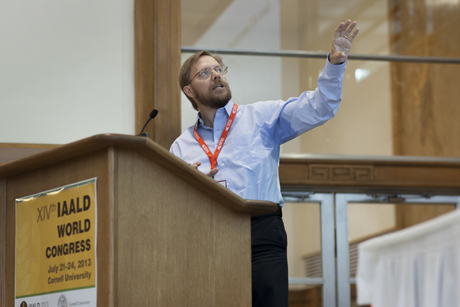Conferees discuss how to help farmers through technology
By Alex Koeberle

Creative use of information networks can help bridge gaps between developed and developing countries, a group of librarians and information specialists were told at an international gathering in Mann Library July 23.
Technology can be especially empowering for small farmers, according to Rikin Gandhi, who participated in a panel discussion on “E-Learning for Impact in Africa.”
Gandhi, chief executive officer and founder of digitalGREEN, explained how he is leveraging smartphone technology and online networks such as YouTube and Google Maps to improve the social, economic and environmental sustainability of developing countries.
By filming farmers in India sharing their agricultural expertise, uploading them to YouTube, and monitoring their views, ratings and comments, Gandhi is able to determine which crops are being planted, their efficiency and if other farmers are adopting the techniques demonstrated in the videos.
“Farmers want to be featured in videos. It helps create a stronger network and allows farmers to become leaders in their communities,” Gandhi said.
His team also plots farmer networks on Google Maps, which helps determine if challenges such as diseases or pests are spreading.
“DigitalGREEN builds on existing social networks to share information among farming communities,” said Gandhi. “We want to empower communities by sharing knowledge, not through monetary awards, and show that agriculture is a choice, not a last resort.”
Gandhi’s presentation was one of several at the packed panel discussion, moderated by Cornell Cooperative Extension Director Helene Dillard. Its aim was to share ways in which technology can be used to address issues such as food security, poverty reduction and youth education.
“We want to create a dialogue within agricultural communities,” said Gandhi. “E-learning is one of many mechanisms for this, and by working with various [nongovernmental organizations], institutions and federal agencies we can build stronger networks internationally.”
The event was part of the four-day World Congress for the International Association of Agriculture Information Specialists that saw 125 information professionals, scientists and practitioners of agriculture information and management from 28 countries converge in Ithaca to share agricultural ideas, methodologies and technologies.
Stefan Einarson, director of information technology for International Programs in the College of Agriculture and Life Sciences, discussed ways in which Cornell University Library helps advance agriculture around the world.
Mann Library, for example, provides expertise, technology and resources for international institutions, such as the University of Ghana and the University of KwaZulu-Natal, where students can access video presentations and journal article databases through the Cornell network to help with their own academic pursuits.
“We are designing new learning platforms for students around the world to have access,” Einarson said. “These include online presentations, discussions, readings and quizzes.”
Alex Koeberle ’13 is a writer with the College of Agriculture and Life Sciences.
Media Contact
Get Cornell news delivered right to your inbox.
Subscribe